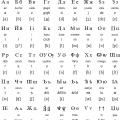Babel
Babel
From the Bible. According to legend, one day the peoples of the Babylonian kingdom decided to build a high tower (in Church Slavonic - “pillar”, respectively “pandemonium” - construction, creation of a pillar): “And they said: “Let us build ourselves a city and a tower, with a height to heaven, and name for ourselves, before we are scattered over the face of the whole earth” (Genesis, chapter 11, v. 4).
God, outraged by the insolence of people, prevented the construction: he “mixed” the languages and dialects of the builders, and they, not understanding each other, could no longer continue the construction of this pillar.
From here popular expression"Babylonian Confusion of Languages".
Allegorically: noise, confusion, disorder produced by a large mass of people (disapproved).
Encyclopedic Dictionary of winged words and expressions. - M.: “Locked-Press”. Vadim Serov. 2003.
Babel
The expression originates from a biblical myth about an attempt to build a tower in Babylon that would reach the sky. When the builders began their work, the angry god “confused their language,” they ceased to understand each other and were unable to continue the construction (Genesis, 11, 1-9). Used to mean: disorder, confusion, noise, turmoil.
Dictionary of catch words. Plutex. 2004.
Synonyms:
See what “Babylonian Pandemonium” is in other dictionaries:
Cm … Synonym dictionary
Babel- Babylonian pandemonium. Tower of Babel. Painting by P. Bruegel the Elder. 1563. Museum of Art History. Vein. PANDEAL OF BABYLON, in the Bible the story of an attempt to build after global flood the city of Babylon and the tower to heaven (Babylon... ... Illustrated Encyclopedic Dictionary
Dictionary Ushakova
BABEL. see pandemonium. Ushakov's explanatory dictionary. D.N. Ushakov. 1935 1940 … Ushakov's Explanatory Dictionary
BABYLON PANELATE, in the Bible a story about an attempt to build the city of Babylon and a tower to heaven after the global flood (Tower of Babel). Angered by the insolence of people, God confused their languages (they ceased to understand each other), scattered them throughout... ... Modern encyclopedia
In the Bible there is a story about an attempt to build the city of Babylon and a tower to heaven after the Flood. Angered by the insolence of the people, God confused their languages so that people ceased to understand each other, and scattered them throughout the entire earth. In a figurative sense, turmoil... Big Encyclopedic Dictionary
In the Bible there is a legend about how God, angry at the insolence of people who intended to build a tower to heaven (the Tower of Babel), confused their languages (they stopped understanding each other) and scattered humanity throughout the entire earth... Historical Dictionary
- (foreign language) disorder, confused noisy conversation Wed. I happened to attend some meetings, and what a Babylonian pandemonium I encountered there, it’s hard to believe... It’s as if everyone speaks different languages, no one wants to listen to anyone, or... ... Michelson's Large Explanatory and Phraseological Dictionary
Babel- Book Disapproved Units only Complete confusion, extreme disorder, disorganization. There are many miracles in this world, but there are even more in our literature. This is a true Babylonian pandemonium, where people... shout in all kinds of languages and dialects, not... Educational phraseological dictionary
Coordinates: 32°32′11″ N. w. 44°25′15″ E. d. / 32.536389° n. w. 44.420833° E. d... Wikipedia
Books
- On the sunny side of the street, Dina Rubina. Dina Rubina’s new novel is news in every sense of the word: an unexpected virtuoso somersault “under the dome of literature”, an absolute transformation of the writer’s style, her usual intonation and range...
The phraseological unit “Babylonian pandemonium” refers to biblical myth. According to legend, the sinful inhabitants of the sinful biblical city of Babylon, where the Whore of Babylon still lived, decided to compete in power with God himself. They began to build a tower, which, according to engineering calculations, was supposed to reach the sky, where the abode of God was located.
Contrary to custom, God did not send thunder and lightning to the daring Babylonians, did not repeat the scenario of the Flood to them, but acted more sophisticatedly - he mixed all language groups. As a result of the act of retaliation, the workers no longer understood the foremen, the foremen could not understand the drawings, and construction stalled. Therefore, everyone quit their jobs at once and scattered to different parts of the planet, giving rise to nations and peoples.
What is “pandemonium?”
In Russian, the phrase “Babylonian pandemonium” means confusion, confusion, in short, a mess created by an uncontrolled crowd.
At first glance, everything is simple, and the topic could be considered closed, if not for one “BUT”...
And, strictly speaking, “pandemonium”? Purely phonetically, an association with the word “crowd” immediately arises. But from the point of view morphological analysis, if we take “crowds” as the root, then what role can the prefix “s” play here, which, according to all dictionaries of the Russian language, firstly, is verbal, and secondly, means movement from different points to one.
That is, according to logic, the expression can mean: “the creation of a crowd from the outside into one spatial interval” is complete absurdity.
Therefore, you should not refine your knowledge of the theory of the Russian language, but simply remember the ancient word “pillar”, in one of the meanings - “monument”. Then everything falls into place. By analogy with a poem-of-creation, a pillar-of-creation is the creation of a monument.
The Russian language creates its own rules
In this case, what does traditional have to do with it? By the way, when you enter the phrase “Babylonian pandemonium” into Google Translate, it returns the result in several languages as “confusion of languages”, and the meaning of “Babel” in European languages is closer to the meaning of “cavil.”
Thus, we are once again faced with the unique capabilities of the “great and powerful” language, which from an obscure expression has created a capacious and meaningful word that does not fit into any rule of the Russian language, but is understandable to any Russian-speaking person.
From the Bible. According to legend, one day the peoples of the Babylonian kingdom decided to build a high tower (in Church Slavonic “pillar”, respectively “pandemonium” construction, the creation of a pillar): “And they said: let us build ourselves a city and a tower, with a height of ... ... Dictionary of popular words and expressions
Cm … Synonym dictionary
Babel- Babylonian pandemonium. Tower of Babel. Painting by P. Bruegel the Elder. 1563. Museum of Art History. Vein. PANDEAL OF BABYLON, in the Bible a story about an attempt to build the city of Babylon and a tower to heaven after the global flood (Babylon... ... Illustrated Encyclopedic Dictionary
BABEL. see pandemonium. Ushakov's explanatory dictionary. D.N. Ushakov. 1935 1940 … Ushakov's Explanatory Dictionary
BABYLON PANELATE, in the Bible a story about an attempt to build the city of Babylon and a tower to heaven after the global flood (Tower of Babel). Angered by the insolence of people, God confused their languages (they ceased to understand each other), scattered them throughout... ... Modern encyclopedia
In the Bible there is a story about an attempt to build the city of Babylon and a tower to heaven after the Flood. Angered by the insolence of the people, God confused their languages so that people ceased to understand each other, and scattered them throughout the entire earth. In a figurative sense, turmoil... Big Encyclopedic Dictionary
In the Bible there is a legend about how God, angry at the insolence of people who intended to build a tower to heaven (the Tower of Babel), confused their languages (they stopped understanding each other) and scattered humanity throughout the entire earth... Historical Dictionary
- (foreign language) disorder, confused noisy conversation Wed. I happened to attend some meetings, and what a Babylonian pandemonium I encountered there, it’s hard to believe... It’s as if everyone speaks different languages, no one wants to listen to anyone, or... ... Michelson's Large Explanatory and Phraseological Dictionary
Babel- Book Disapproved Units only Complete confusion, extreme disorder, disorganization. There are many miracles in this world, but there are even more in our literature. This is a true Babylonian pandemonium, where people... shout in all kinds of languages and dialects, not... Educational phraseological dictionary
Coordinates: 32°32′11″ N. w. 44°25′15″ E. d. / 32.536389° n. w. 44.420833° E. d... Wikipedia
Books
- On the sunny side of the street, Dina Rubina. Dina Rubina’s new novel is news in every sense of the word: an unexpected virtuoso somersault “under the dome of literature”, an absolute transformation of the writer’s style, her usual intonation and range...
- Secrets of Babylon, V. A. Belyavsky. What was Babylon like twenty-five centuries ago? Did the Pandemonium of Babel really happen or was it a fiction? What were the Hanging Gardens of Babylon and how were they built?
Let's take a closer look at the biblical phraseological unit "Babylonian pandemonium" .
And also the question, was there In fact Was the Tower of Babel built?
Below are the meaning and origin of phraseological units, as well as examples from the works of writers.
The meaning of phraseology
Babel - mess; seething crowd; confusion
Synonyms: bedlam, chaos, doomsday, confusion
IN foreign languages There are direct analogues of the phraseological unit “Babylonian pandemonium”:
- babel; building of the tower of Babel (English)
- Babylonische Verwirrung (German)
- tour de Babel (French)
Pandemonium of Babel: the origin of phraseological units
According to biblical legend, after the Great Flood there was only one people left on earth who spoke the same language. They came from the east to the land of Shinar (in the lower reaches of the Tigris and Euphrates) and planned to build a high tower (“pandemonium” is the building of a tower): “And they said: Let us build ourselves a city and a tower, with its height reaching to heaven, and we will make a name for ourselves, before we are scattered over the face of the whole earth" (Genesis 11:4).
But God opposed this manifestation of human insolence and made sure that the construction of the Tower of Babel was interrupted: “Let us go down and confuse their language, so that one does not understand the speech of the other. And the Lord scattered them from there over all the earth; and they stopped building the city (and the tower).” (Genesis 11, 7-9). By the way, this is where the phraseology “Babylonian confusion of languages” came from.
Agree, the legend is beautiful and very instructive. However, there is evidence that things actually happened somewhat differently.
In Mesopotamia they actually built high tower-temples (they were called ziggurats), which were used for religious rites and astronomical observations. Moreover, the highest ziggurat (91 m high) was located in Babylon (Etemenanki). This temple was built no later than the beginning of the second millennium BC.
Perhaps the origin of the legend was facilitated by the fact that during the period of the resettlement of Jews to Babylon by Nebuchadnezzar II after his destruction of the Kingdom of Judah, the ziggurat of Etemenanki, destroyed by the Assyrians, was being restored.
Source
The legend of the construction of the Tower of Babel is described in the Old Testament (Genesis, 11, 1-9).
Examples from the works of writers
Residents of India, Russians, Chinese, Spaniards, Portuguese. The British, French, Neapolitans, Genoese, Venetians, Greeks, Turks, descendants of all the builders of the Tower of Babel, who arrived in Marseille to trade, were equally looking for shade, ready to hide anywhere just to escape the blinding blue of the sea and the fiery rays of the gigantic diamond set into heavenly purple. (C. Dickens, “Little Dorrit”)
- The others talked too much, sir. I listened. Well,” he added, after a pause and raising his eyebrows in a funny way, “did you like our Babylonian pandemonium?”
- Precisely pandemonium. You said it perfectly. I kept wanting to ask these gentlemen, why are they making such a fuss? (I.S. Turgenev, “Smoke”)
People were pouring down the street, a real pandemonium, faces, faces and faces, winter coats with cotton wool and lambskin hats, old men, students and children, railway workers in uniform, workers of the tram depot and telephone exchange in over-the-knee boots and leather jackets, high school students and students . (B.L. Pasternak, “Doctor Zhivago”)
So, the phraseological unit “Babylonian pandemonium” Not only allows you to beautifully designate all kinds of mess, and not only reminds us of a dramatic episode in God's relationship with people, but also puts interest Ask about the real fate of the Tower of Babel.
Pandemonium of Babel - disorder, chaos; an unorganized, multilingual, motley crowd; hectic activity.The phraseological unit owes its origin to the Old Testament, more precisely, to the book of Genesis (11:1-9), which tells how people who first spoke the same language decided to build a tower to heaven. God did not like this idea, as he saw in it a manifestation of pride. And as punishment for her, he confused the languages of the builders so that they could not agree among themselves.
- “And throughout the whole earth there was one language and few words.
- And it happened: moving from the east, they found a valley in the land of Shinar, and settled there.
- And they said to each other: Let us make bricks and burn them with fire. And they had bricks instead of stones, and they had mountain tar instead of clay.
- And they said, Let us build ourselves a city and a tower with its head reaching to heaven, and make a name for ourselves, so that we are not scattered over the face of all the earth.
- And the Lord came down to see the city and the tower which the sons of men were building.
- And the Lord said: after all, the people are one and they all have one language; and they began to do this; and now will not everything that they plan to do be unattainable for them?
- Let us go down and confuse their language there, so that they will not understand each other’s speech.
- And the Lord scattered them from there over all the earth; and they stopped building the city.
- Therefore its name was called Babylon, for there the Lord confused the language of all the earth, and from there the Lord scattered them over the face of all the earth.”
Synonyms of the expression “Babylonian Pandemonium”
- Mess
- Mess
- Light show
- Bedlam
- Passage yard
- Mad house

Some commentators on the history of the Tower of Babel argue that the builders did not intend to reach the sky and thereby shake the authority of God. They feared a repeat of the Flood and hoped to wait it out on higher ground. And God punished people not for showing arrogance and ambition, but for insulting the divine covenant to people, given to them by Noah before the Flood: “be fruitful and multiply and fill the earth”




